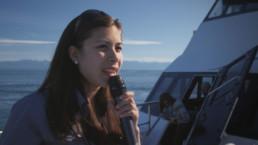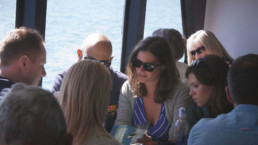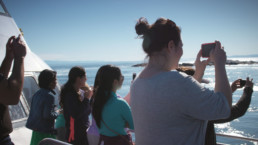Whale Conservation



- Be cautious and courteous — approach areas of known or suspected marine mammal activity with extreme caution. Look in all directions before planning your approach or departure.
- Reduce speed to less than seven knots when within 400 meters of the nearest whale. Avoid abrupt course changes.
- Avoid approaching closer than 200 meters to any whale.
- Stop immediately and allow the whales to pass if the vessel is unexpectedly within 100 meters.
- Keep clear of the whales’ path and avoid positioning within the 400 meter area in the path of the whales.
- Stay on the offshore side of the whales when they are traveling close to shore. Remain at least 200 meters offshore at all times.
- Limit viewing time to a recommended maximum of 30 minutes.
- Do not swim with or feed whales.
- Avoid farmed Atlantic salmon. Farmed salmon have a detrimental effect on our wild populations, causing issues like the spread of disease, environmental pollution (the concentrated antibiotics, pesticides and chemicals used in farms often leach into local waters) and a potentially weaker salmon gene pool due to wild-farmed salmon hybrids.
- Choose organic food to reduce the amount of pesticide/herbicide runoff from agriculture.
- Avoid using toxic pesticides and fertilizers in your yard and garden.
- Wash your car at a car wash or on your lawn instead of the street to prevent oil, paint and soap from entering storm drains.
- Shop local and bike, walk, carpool or use public transportation to reduce the use of fossil fuels.
- Change your car brakes to non-copper ones, as copper shavings get into storm water through normal break wear, and copper is extremely toxic to fish.
- Use biodegradable cleaning supplies.
- Perform regular maintenance checkups on your car to make sure it is not leaking fluids, they could end up in our waterways.
- Use reusable shopping bags and stainless steel water bottles instead of plastic bags and bottles, which often end up in the ocean.
- If you live in the Northwest, get involved in salmon habitat restoration to help protect the wild salmon that remain and increase their numbers, so that orcas have the food they need to survive.
- Observe all guidelines for watching whales and observing marine life.
- Do not drive through groups of porpoises or dolphins for the purpose of bow-riding.
- Reduce speed gradually and avoid sudden course changes, should dolphins or porpoises choose to ride the bow wave of vessel.
- Avoid approaching closer than 100 meters to any marine mammals or birds.
- Slow down and reduce your wake/wash and noise.
- Pay attention and back away at the first sign of disturbance or agitation.
- Be cautious and quiet when around haulouts and bird colonies, especially during breeding, nesting and pupping seasons (generally May to September).
- Do not swim with or feed any marine mammals or birds.
